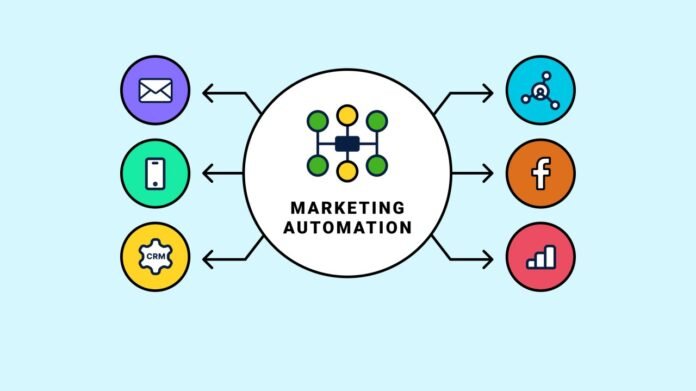Key Takeaways:
- Marketing automation eliminates redundant tasks, making processes more efficient.
- AI and machine learning are revolutionizing personalized marketing campaigns.
- Data analytics derived from automation tools provide actionable insights for marketers.
The Rise of Marketing Automation
Marketing automation has become a cornerstone of modern marketing strategies. Businesses of all sizes are reaping the benefits of marketing automation systems that handle repetitive tasks, allowing human resources to focus on strategy and creativity. The ability to streamline marketing efforts not only saves time but also increases the overall efficiency of campaigns. Businesses may lower the possibility of human error and guarantee the timeliness and consistency of their marketing initiatives by automating processes like email marketing, social media posting, and ad management.
Moreover, marketing automation offers the scalability that manual methods can’t provide. For instance, a small business using automation tools can conduct marketing efforts that rival larger companies. As a result, marketing automation levels the playing field, enabling smaller enterprises to compete more effectively in the marketplace.
Additionally, through analytics and reporting, marketing automation offers insightful data that enables companies to monitor the effectiveness of their efforts in real-time. These insights help make data-driven decisions, optimize strategies, and improve ROI. Another significant benefit of marketing automation is personalization, which allows companies to adapt their communications to each customer’s unique interests and habits. This personalized approach enhances customer engagement and can lead to higher conversion rates. Furthermore, marketing automation platforms often integrate with CRM systems, ensuring customer data is seamlessly shared across different departments, fostering better collaboration and a unified approach to customer management.
Benefits of Marketing Automation
- Increases efficiency by automating repetitive tasks.
- Enhances customer experience through personalized communication.
- Provides detailed analytics and insights for data-driven decision-making.
One of its main advantages is the notable boost in efficiency that comes with marketing automation. By automating routine processes like social media scheduling and email campaigns, firms can increase employee productivity by giving them more time to focus on more strategic operations.
Additionally, automation tools enhance the customer experience by enabling more personalized communication. Consumers are more likely to engage with the brand when they receive messages tailored to their preferences and behaviors. Personalized marketing fosters brand loyalty and raises client satisfaction.
Another crucial benefit of marketing automation is the provision of detailed analytics and insights. With the sophisticated analytics features that come with modern automation technologies, marketers can monitor the effectiveness of their efforts in real-time. Businesses may use these insights to enhance strategy, make data-driven decisions, and improve outcomes.
AI and Machine Learning in Marketing
Machine learning and artificial intelligence (AI) will significantly impact marketing automation in the future. These technologies help create personalized marketing campaigns by analyzing customer behavior and predicting future trends. According to experts, AI-driven marketing can significantly enhance customer engagement and ROI. Companies may deliver highly tailored and relevant content by employing AI to acquire deeper insights into consumer preferences and habits.
Furthermore, machine learning algorithms can recognize patterns and trends that human analysts might not see right away. Businesses can keep ahead of changes in the market because they can handle and analyze vast amounts of data quickly and precisely. For example, predictive analytics can forecast customer needs and preferences, enabling proactive marketing strategies that address those needs effectively.
Data-Driven Insights
Another advantage of marketing automation is the provision of data-driven insights. The ability to analyze large datasets helps marketers make informed decisions and optimize their strategies for better results. Businesses may gain access to comprehensive data reports to analyze the success of their efforts, monitor essential performance indicators, and make necessary modifications in real-time.
Data-driven insights also facilitate audience segmentation, allowing marketers to target different consumer groups with customized messages. Segmentation is essential for executing marketing initiatives effectively and ensuring the correct message reaches the right audience at the right time.
The Role of CRM Systems
Marketing automation tools are frequently connected with Customer Relationship Management (CRM) systems to optimize business processes. Thanks to this connection, customers are guaranteed to receive pertinent and consistent messages, which also helps to keep communication channels unified.
CRM systems can significantly improve customer retention and satisfaction with marketing automation. They let companies better manage leads, monitor client interactions, and automate follow-up procedures.
The synergy between CRM and marketing automation platforms facilitates a unified approach to managing customer relationships. For instance, automated workflows can trigger personalized emails based on customer interactions the CRM system tracks. As a result, customers will receive timely and pertinent communications, improving their overall experience and promoting enduring loyalty.
Additionally, CRM systems provide valuable insights through data analytics, enabling businesses to understand customer behavior and preferences more deeply. This data-driven methodology aids in customizing marketing plans to suit the requirements of various clientele groups better. Businesses may make better decisions by identifying trends and areas for improvement with the help of comprehensive reporting and analytics.
The integration also supports sales teams by providing real-time access to customer information, which enhances their ability to close deals and manage customer relationships effectively. Integrating CRM and marketing automation increases operational efficiency and spurs growth because it allows for a more tailored and exciting customer experience.
The Future Outlook
As technology continues to evolve, so will marketing automation tools. Future advancements may include more sophisticated AI, improved data analytics, and even higher levels of personalization. Marketers willing to embrace these changes will likely find themselves at the forefront of their industry, ready to meet their customers’ needs and expectations. It’s an exciting time for marketing professionals, as integrating advanced technologies promises to unlock new opportunities and drive innovation in the field.
Moreover, as consumer expectations continue to rise, the demand for personalized and seamless experiences will drive further advancements in marketing automation. Businesses that implement these technologies early on will gain a competitive edge and establish themselves as leaders in an increasingly digital and data-driven world.
